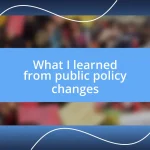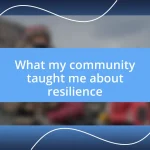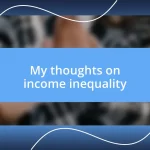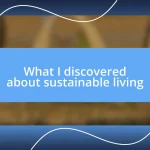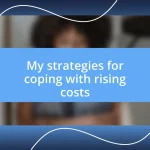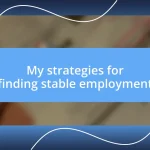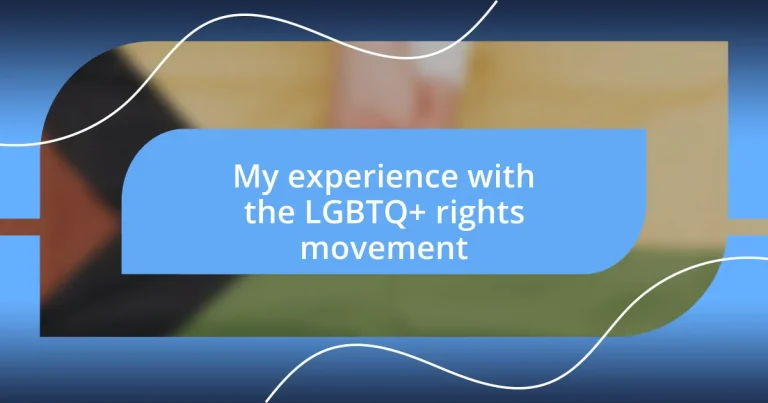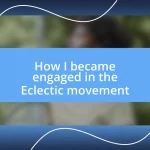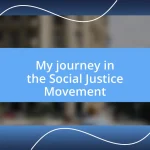Key takeaways:
- The Stonewall Riots of 1969 were a pivotal event that catalyzed the modern LGBTQ+ rights movement, symbolizing resistance against systemic oppression.
- The founding of the Human Rights Campaign in 1980 marked a significant step in advocating for LGBTQ+ equality and political representation.
- The landmark Supreme Court case Obergefell v. Hodges in 2015 legalized same-sex marriage in the U.S., representing a major triumph for LGBTQ+ rights after years of activism.
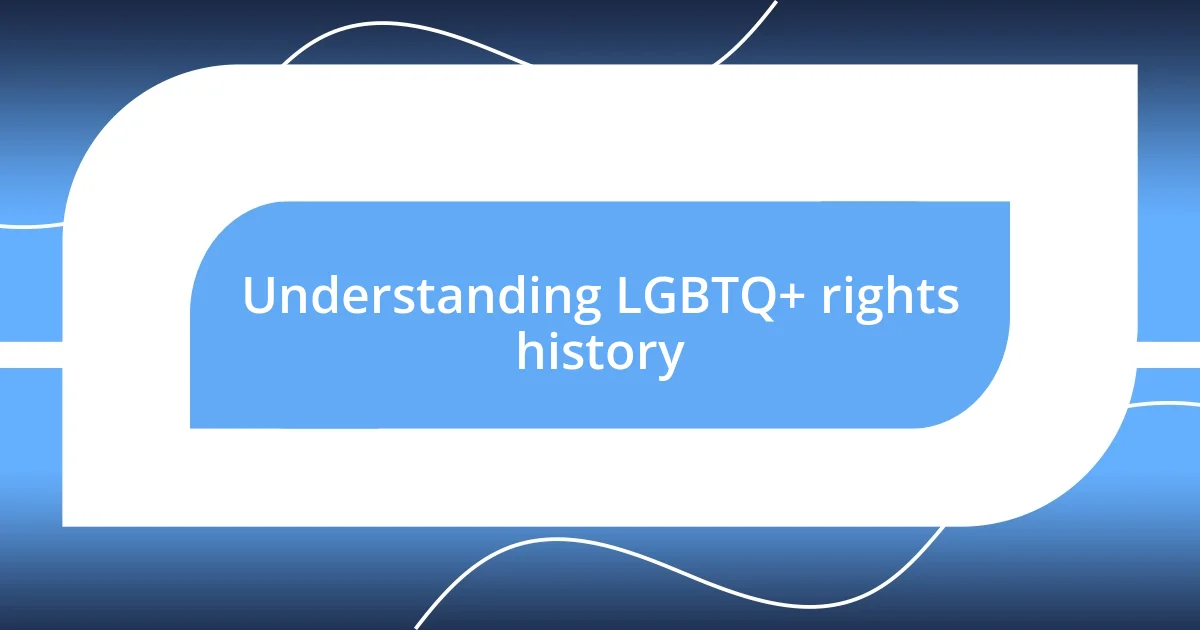
Understanding LGBTQ+ rights history
Understanding the history of LGBTQ+ rights is essential to grasp how far we’ve come and how far we still need to go. I recall standing at my first pride parade and feeling a surge of empowerment as I witnessed the community’s resilience over decades of struggle. Isn’t it incredible to think that just a few decades ago, being LGBTQ+ was often criminalized or pathologized?
The Stonewall Riots of 1969 marked a pivotal moment in this journey. As I learned about those brave souls who fought back against police oppression, it struck me how their defiance sparked a global movement. How many of us are aware that such small, yet fierce acts of resistance paved the way for the rights we enjoy today?
Throughout the years, activism has ebbed and flowed, driven by the passion of countless individuals. I sometimes wonder if the quiet moments of fear and uncertainty felt by those early activists are echoed in our own lives today. Despite the progress, the fight for equality continues, reminding us that understanding our history equips us to advocate for a brighter future.
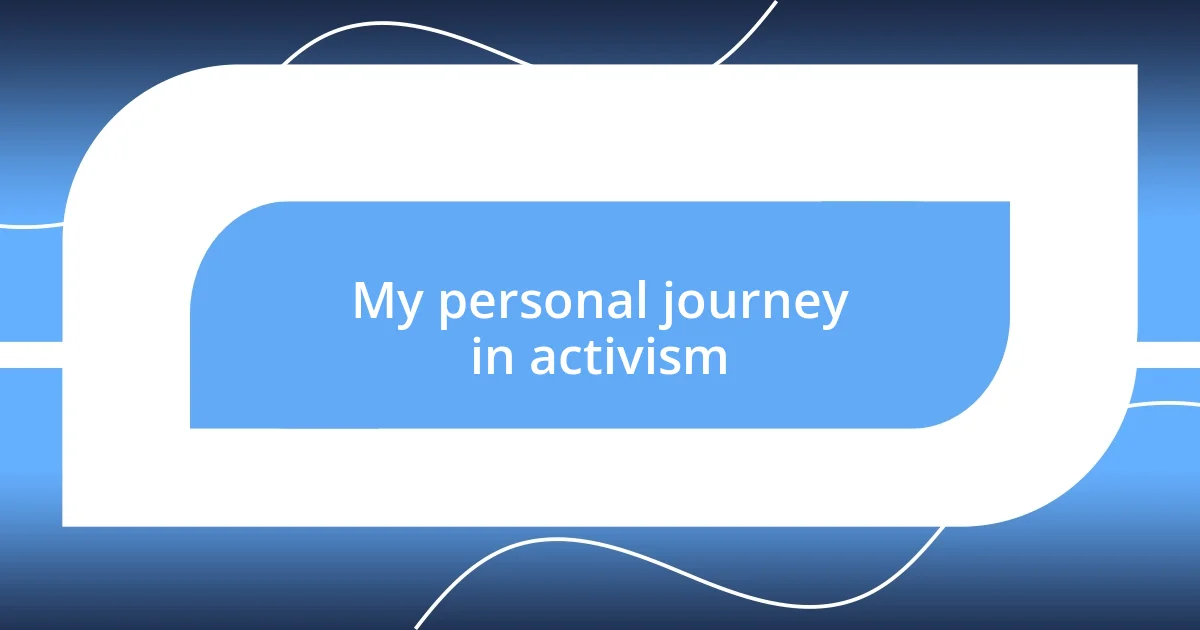
My personal journey in activism
I still vividly remember my first experience as an activist at a local LGBTQ+ rally. I was both terrified and exhilarated to share my story, knowing that my voice could contribute to something larger than myself. The feeling of solidarity with others who had also faced discrimination was electrifying; it was as if we were all pieces of a puzzle coming together to demand change.
Over time, I transitioned from being a participant to a more vocal advocate. I took part in organizing community workshops that aimed at educating others about LGBTQ+ issues. I found joy in watching participants leave with newfound empathy and understanding; these moments made all the late nights of planning and preparation worthwhile. How fulfilling it was to connect with others and witness their transformation, just as I had experienced my own!
Reflecting on my journey, I realize that activism is deeply personal yet universal. Each conversation I had with supporters fueled my resolve. The tears, laughter, and sometimes heated debates made me appreciate the complexity of our stories. Activism taught me resilience, compassion, and the immense power of collective action.
| Aspect | My Personal Journey |
|---|---|
| First Experience | Local LGBTQ+ rally; terrified yet exhilarated. |
| Role Evolution | Transitioned from participant to organizer of community workshops. |
| Emotional Insights | Deepened understanding through conversations and connections. |
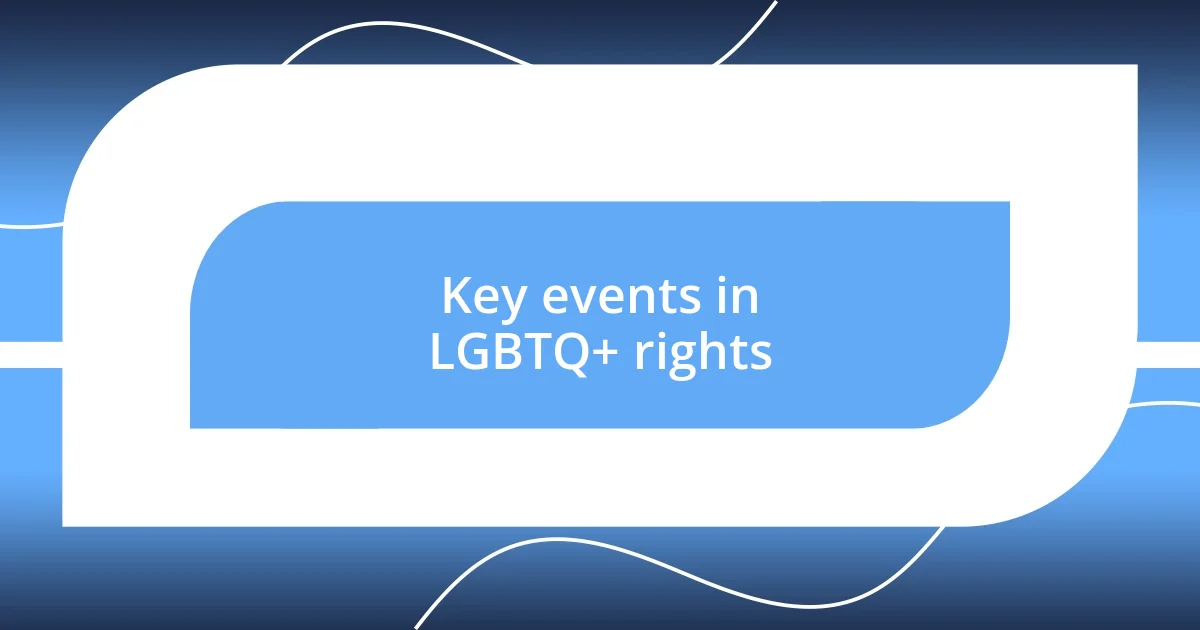
Key events in LGBTQ+ rights
Key events in the LGBTQ+ rights movement serve as milestones that highlight both struggles and triumphs. I remember studying the aftermath of the AIDS crisis in the 1980s, realizing how it forged a fierce community connection. The heartbreak drove activists to the streets, demanding action. It was inspiring to see how their pain transformed into advocacy, forever changing public perception and policy regarding LGBTQ+ rights.
Some key events in this ongoing battle for equality include:
- Stonewall Riots (1969): Often cited as the catalyst for the modern LGBTQ+ rights movement, these riots symbolized resistance against systemic oppression.
- Founding of the Human Rights Campaign (1980): This organization became pivotal in advocating for LGBTQ+ equality and establishing a political voice.
- Don’t Ask, Don’t Tell (1993): Although controversial, its repeal in 2011 marked a significant step toward the acceptance of LGBTQ+ individuals in the military.
- Obergefell v. Hodges (2015): The landmark Supreme Court case recognized same-sex marriage as a constitutional right in the United States, a testament to years of tireless activism.
- Transgender Rights Movement: Gaining traction since the late 20th century, this movement addresses the unique challenges faced by transgender individuals, striving for comprehensive healthcare and legal recognition.
Reflecting on these events, I often feel a mix of pride and sorrow. Each milestone represents not just progress, but the sacrifices and struggles of countless individuals. It reminds me that while we’ve achieved a lot, there’s still much to be done.
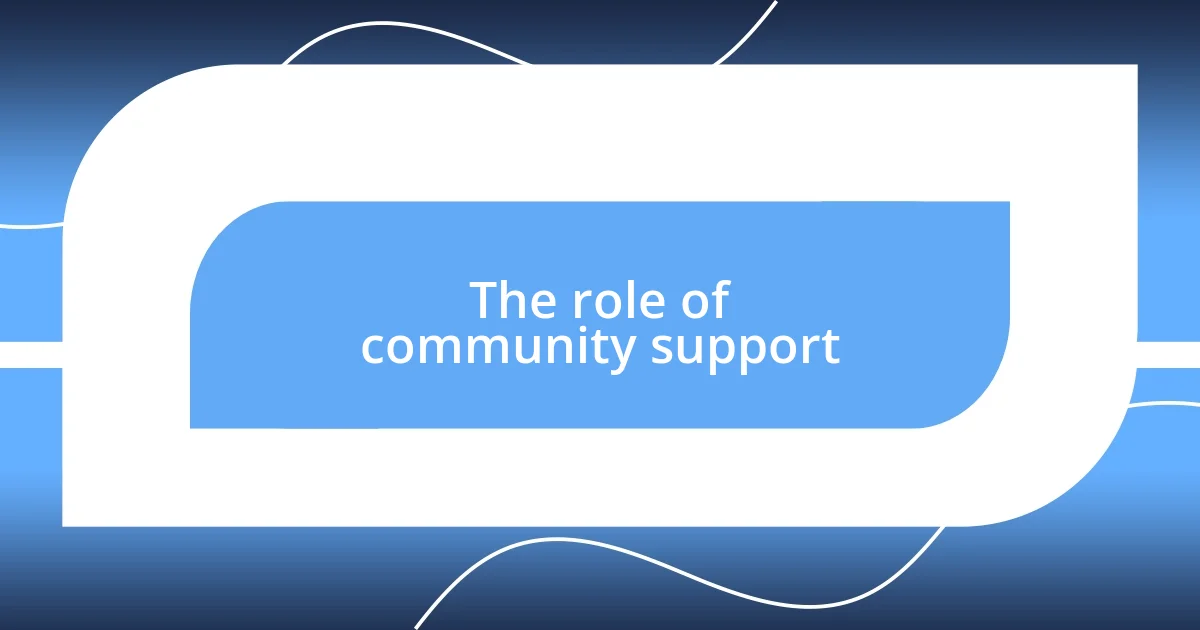
The role of community support
Community support has always been the backbone of the LGBTQ+ rights movement. I still remember the first time I walked into a support group meeting. The warmth and acceptance enveloped me instantly; it was a stark contrast to the isolation I had felt for so long. In that safe space, we shared our fears, dreams, and the struggles we encountered. It made me realize how critical it is to have a network that not only listens but genuinely understands our journeys.
In my experience, community support also acts as a powerful motivator for activism. One evening, while volunteering at a local LGBTQ+ center, I met a young person who was grappling with coming out. Hearing their story reminded me of my own challenges, but it also sparked a fire in me. Supporting one another—even just by sharing a story—can be transformative. This interconnectedness drives us to advocate for one another, amplifying our voices in a chorus demanding change.
The impact of community support goes beyond individual support; it fosters collective resilience. During challenging times, like when legislative setbacks threatened our rights, I found comfort in the solidarity of my peers. Participating in marches and rallies together felt empowering, as if we were forming an unbreakable bond. Isn’t it remarkable how shared experiences can cultivate such strength? Knowing that others stand beside you makes the daunting fight for equality feel achievable.
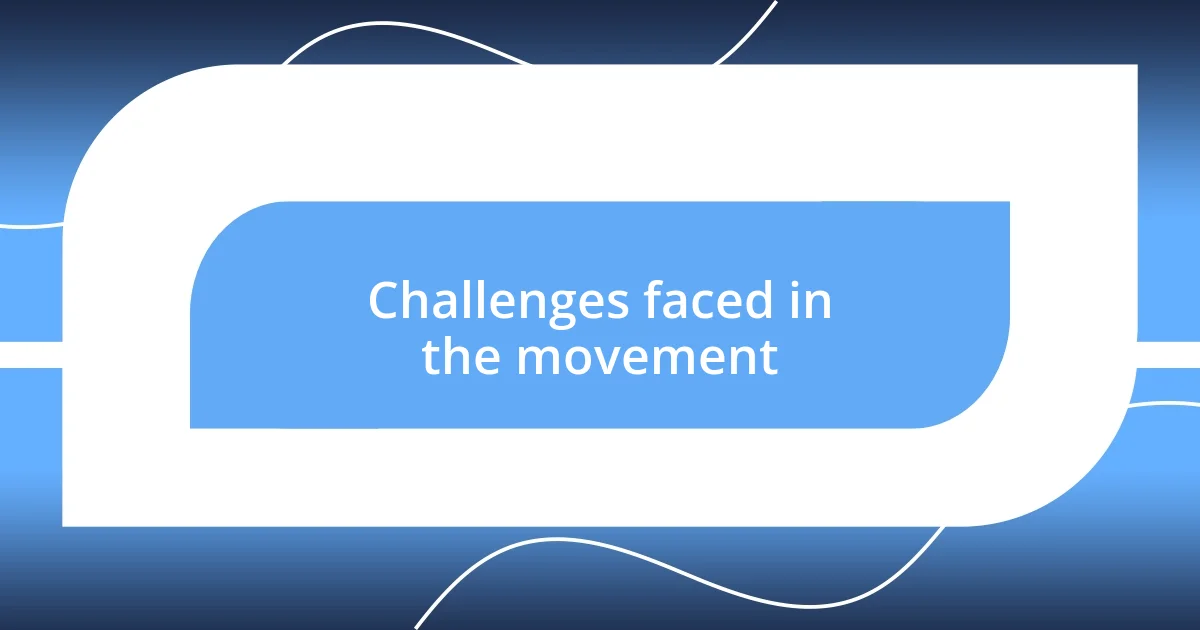
Challenges faced in the movement
The challenges faced in the LGBTQ+ rights movement are as diverse as they are significant. I often reflect on moments when I felt the weight of discrimination, such as when friends or family members struggled to accept my identity. The emotional toll can be isolating, and it’s a challenge many of us have faced. How do you reconcile love for your family with their reluctance to fully understand who you are? For me, these moments became pivotal, pushing me to seek out allies and advocates who understood the pain of living in a society that doesn’t always accept us.
Institutional barriers present another layer of difficulty. I vividly recall a time when a friend attempted to access healthcare that considers their identity and needs. The systemic lack of comprehensive healthcare for LGBTQ+ individuals is disheartening. It left my friend feeling vulnerable and unheard. Have you ever experienced a system that seems to fail you at your most crucial moment? Those moments surfaced a critical realization in me: advocacy for policy change is absolutely necessary. We need to ensure that everyone can access affirming and supportive care.
Furthermore, navigating a world filled with misinformation is a constant battle. I remember attending a community forum where false narratives about the LGBTQ+ community were prevalent. It was alarming to see how stereotypes could shape public opinion and policy. How do we drown out those harmful whispers in a society eager to listen and believe? I found solace in the fact that we can combat misinformation with education and openness. Sharing personal stories, like mine, can be a bridge to foster understanding, transforming skepticism into acceptance. Through these collective efforts, we strive to overcome the hurdles that persist in our quest for equality.
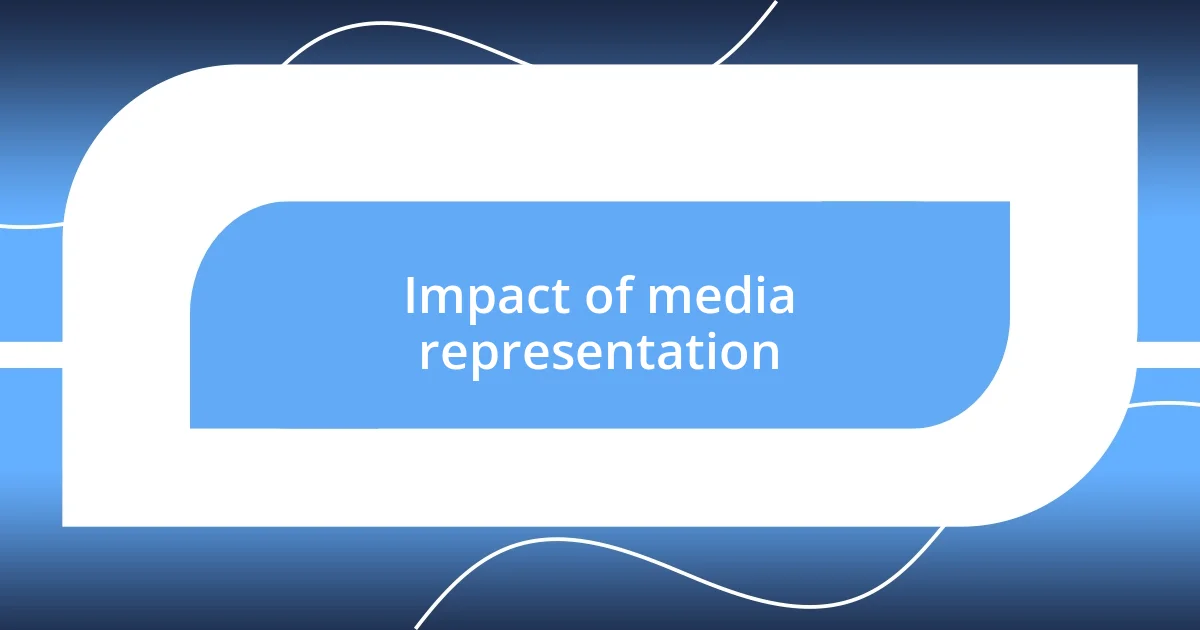
Impact of media representation
Media representation plays a pivotal role in shaping societal perceptions of the LGBTQ+ community. I remember the first time I saw a character on a popular TV show who was openly gay. It resonated deeply with me and made me feel less alone. Representation matters; it validates experiences and challenges stereotypes that can lead to misunderstanding. Isn’t it fascinating how a single character can foster empathy and provoke discussions about acceptance?
Through my involvement with various advocacy groups, I’ve witnessed firsthand the impact of positive LGBTQ+ representation in films and television. When mainstream media began showcasing authentic LGBTQ+ narratives, it felt monumental. I recall attending a film festival where I watched stories that reflected my own journey. The audience’s reactions were illuminating; laughter, tears, and a visible connection filled the room. It was a reminder that these portrayals not only entertain but also educate viewers who might otherwise be uninformed or misled about our realities.
On the flip side, negative portrayals can perpetuate harmful stereotypes and deepen misconceptions. I can’t help but think back to a documentary I watched that misrepresented LGBTQ+ lives through sensationalism rather than truth. It made me wonder—how can we hold media accountable for the stories they tell? As both consumers and advocates, we must critically engage with content and challenge narratives that don’t accurately reflect our communities. Ultimately, the responsibility for championing good representation lies with all of us.
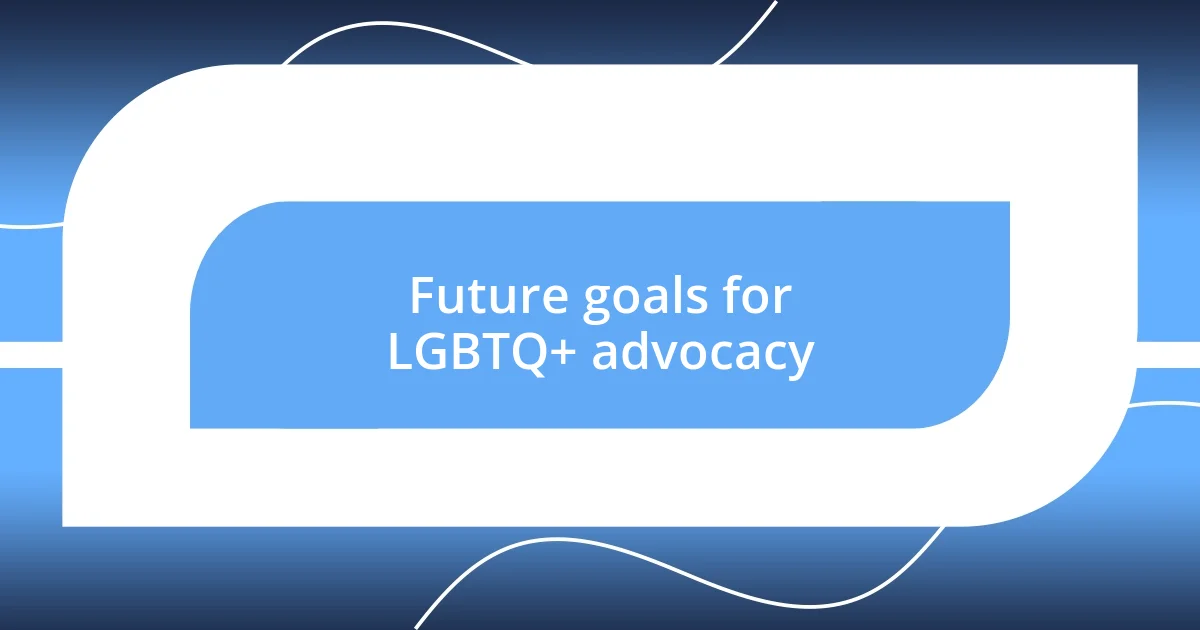
Future goals for LGBTQ+ advocacy
One future goal for LGBTQ+ advocacy must focus on legislative change, particularly around anti-discrimination protections. I recall a conversation with a fellow advocate who shared their frustration about being denied housing because of their sexual orientation. It’s chilling to think this still happens in many places! By pushing for laws that explicitly protect LGBTQ+ individuals across all sectors, we create a safer environment where everyone can thrive without fear or stigma.
Another critical area of focus is mental health support tailored specifically for the LGBTQ+ community. I remember feeling overwhelmed during a particularly challenging period of my life, and it wasn’t easy to find counseling that acknowledged my unique experiences and struggles. Wouldn’t it make a difference if everyone had access to mental health resources that fully understood their identity? Prioritizing the development of programs that cater to our needs would foster resilience and acceptance, offering support when it’s needed most.
Finally, fostering intergenerational alliances is imperative for the future of advocacy. Connecting younger activists with seasoned advocates brings fresh energy to the movement while honoring the wisdom of those who’ve been fighting for decades. I often find myself inspired by stories shared by older members of our community, who faced challenges I can hardly imagine. How can we bridge this gap to ensure everyone feels valued and heard? When we unite across generations, we not only celebrate our history but also equip the next wave of advocates with the tools they need to continue the fight.

